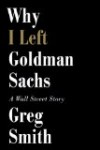After reading this book, I have became more convinced than ever that intelligent investors should make their own investment choices, using the sound principles recommended by Ben Graham and Warren Buffett. If they can’t do that, they should put their share investment money into an appropriate index fund rather than a mutual fund. Greg Smith’s account of his time at Goldman Sachs says a lot about the way mutual funds invest your money.
Smith went to work for Goldman Sachs as an intern and worked his way up to the position of vice-president - not as grandiose as it sounds, because there are hundreds of them in the firm. Still, it was high enough for Smith to be in a position to see exactly what the firm was doing while he was there.
Smith bemoans the gradual erosion of ethical principles at Goldman Sachs. The founders and their successors, before the firm went public, formulated ethical business rules for Goldman managers and employees. Rule 2 stated that:
Our assets are our people, capital and reputation. If any of these is ever demolished, the last is the most difficult to fill.
Smith says that, as people in the firm became greedier, this rule went by the wayside and was replaced by an ethos of putting the firm before the client. This led to a belief that there was no form of fiduciary duty owed to clients who traded through Goldman Sachs, allowing the firm to benefit from trades at the client’s expense. Smith details many instances of this.
Allied to this was the personal greed of individuals in the firm from high to low, partly caused, in Smith’s view, from a change in the way bonuses were paid. When he first went there, bonuses were calculated on fees earned by the employee and an assessment of the value that the employee added to the firm. This was replaced by a system of bonuses payable only on the amount of fees that the employee generated. As Smith was told by his supervisor, “We are not interested in ideas … only in numbers.”
This in turn generated a loss in reputation. Smith was shocked when, after being posted to London, and giving a long talk on the ethos of the firm to a client, he was told by the client that it did not trust Goldman Sachs an inch but would still continue to deal with it because of its expertise and reach.
What particularly surprised me, and the thing that convinces me to steer clear of mutual funds, is that Goldman Sachs, as with presumably other banks and advisory firms, was able to persuade, with little effort, managers of mutual funds, (even those that were otherwise capably run or which were conservative in their investment attitude) to buy risky derivatives of the kind that almost wrecked the financial system. I got the impression that many of these fund managers were just too lazy or too dumb, or simply didn’t care. I suspect that if you recommended to the average mutual fund member that he or she put their money into some bizarre and complex derivative, they would turn you down flat. Yet, at the heights of this insanity, and without the knowledge or approval of members, fund managers were doing just that with members’ funds.
Smith recounts how, at a crisis point in the financial meltdown, Warren Buffett publicly stepped in and helped out Goldman Sachs by taking a multi-billion dollar position in the firm in preferred shares. This was a good transaction for Buffett as he got a good coupon rate and priority of payment with the option to convert into ordinary stock down the track. It also boosted the confidence both of Goldman and the market generally. Buffett said at the time that Goldman Sachs was an exceptional institution with outstanding intellectual and financial capital and emphasized its global reach and good management. A Goldman director commented that Buffett’s investment meant that he had great faith in the integrity of the firm.
If the director correctly interpreted Buffett’s statement, I can only assume that Buffett was speaking with his tongue in his cheek because shortly after the director spoke, Goldman was prosecuted for misleading a large hedge fund and had to pay out nearly a billion dollars in settlement. This incident is colorfully recounted in Smith’s book. The company subsequently has had fines imposed on it by the SEC but these amounts are insignificant when set against Goldman’s earnings. One might wonder about Buffett’s faith in this company, particularly as he has often commented upon the need for integrity in business.
This is an interesting and well written book. It will not teach you how to invest but it will probably teach you to be very careful in who you choose to invest your retirement funds. I also wouldn’t be buying stock in Goldman Sachs anytime soon.
Purchase Why I Left Goldman Sachs: A Wall Street Story at Amazon.com![]()
Watch an interview with Greg Smith from 60 Minutes:




